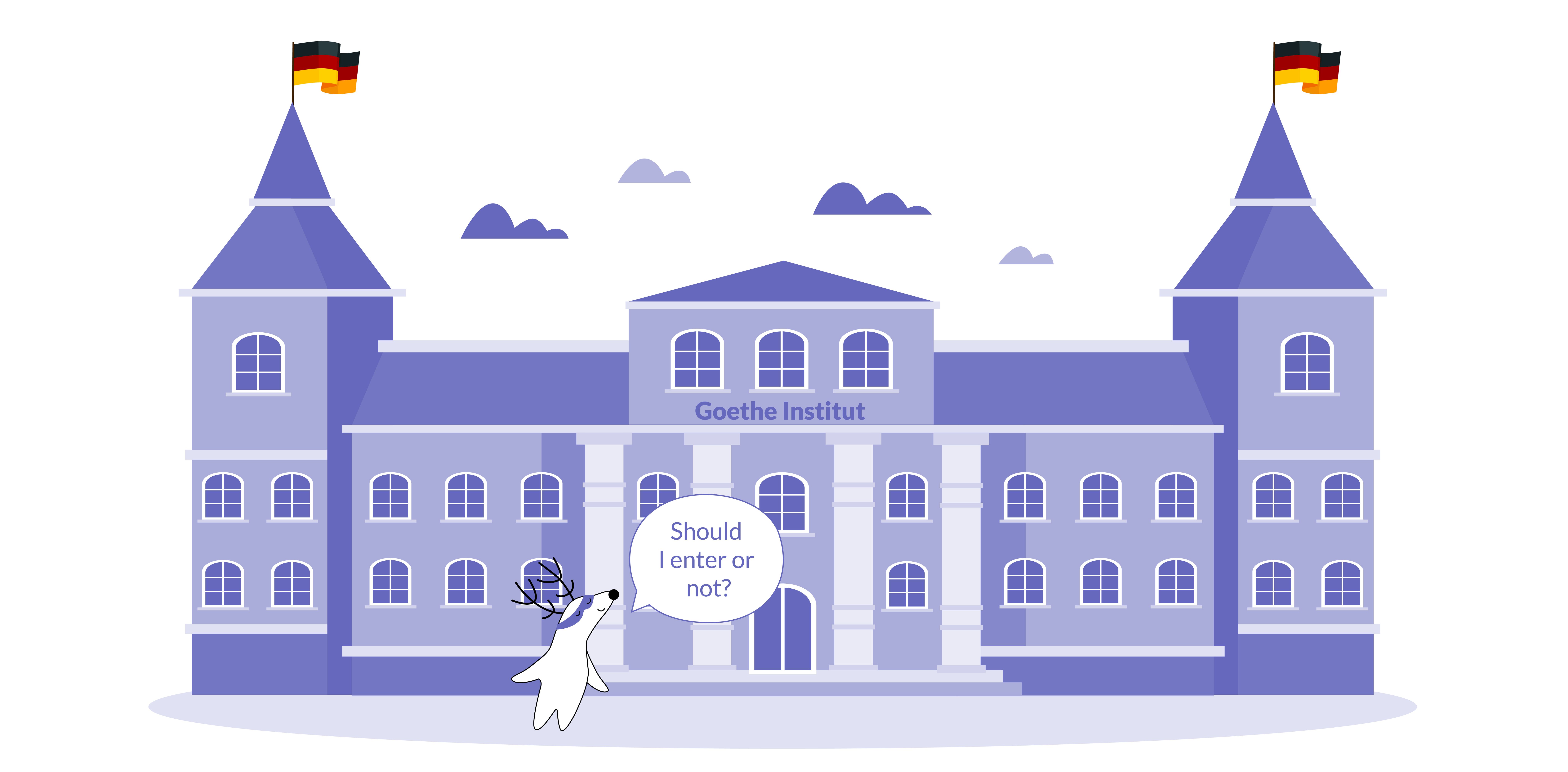- Application process for Germany VISA
- Germany Travel Health Insurance
- Passport Requirements
- Visa Photo Requirements
- Germany Visa Fees
- Do I need a Visa for short stays in Germany?
- How to Get Flight Itinerary and Hotel Booking for Visa Application
- Germany Airport Transit Visa
- Germany Business VISA
- Guest Scientist VISA
- Germany Job Seeker Visa
- Medical Treatment VISA
- Tourist & Visitor Visa
- Trade Fair & Exhibitions VISA
- Training or Internship VISA
- Study Visa for Germany
- Working (Employment) VISA
- German Pronunciation
- German Volabulary
- Requirements
- Health Insurance
- Trend & Living
- Free Assessment Form
- Privacy Policy

Easy German Essays for Beginners: 8 Examples to Practice Your Language Skills

Are you a beginner in learning German and looking for ways to practice your language skills? One great way to do so is by writing essays in German. Writing essays not only improves your grammar and vocabulary but also helps you express your thoughts and ideas in the target language. In this article, we will provide you with eight easy German essays for Beginners with English translation and vocabulary to help you get started.
- Meine Familie (My family) – Write about your family, including their names, occupations, and hobbies.
- Mein Haus (My house) – Describe your house or apartment, including the number of rooms, furniture, and decorations.
- Meine Hobbys (My hobbies) – Talk about your favorite hobbies, such as playing sports, reading books, or listening to music.
- Meine Schule (My school) – Write about your school, including its location, teachers, and subjects you study.
- Meine Freunde (My friends) – Discuss your friends, including how you met them, their personalities, and what you like to do together.
- Meine Stadt (My city) – Describe your city or town, including its population, tourist attractions, and cultural events.
- Meine Reise (My trip) – Write about a recent trip you took, including the destination, transportation, and activities you did there.
- Meine Lieblingsessen (My favorite food) – Talk about your favorite foods, including traditional German dishes and other international cuisines.
Remember to use simple vocabulary and sentence structures while writing the essays. Good luck with your German learning journey!
Table of Contents
Meine familie (my family).
Ich heiße Maria und ich möchte euch gerne meine Familie vorstellen. Wir sind insgesamt vier Personen in meiner Familie. Mein Vater heißt Klaus und er arbeitet als Ingenieur. Meine Mutter heißt Petra und sie ist Hausfrau. Mein Bruder heißt Jan und er geht noch zur Schule.
(My name is Maria, and I would like to introduce you to my family. We are a family of four. My father’s name is Klaus, and he works as an engineer. My mother’s name is Petra, and she is a homemaker. My brother’s name is Jan, and he still goes to school.)
Vocabulary:
- Ich heiße Maria (My name is Maria)
- insgesamt (altogether)
- vier Personen (four persons)
- der Vater (father)
- arbeiten (to work)
- der Ingenieur (engineer)
- die Mutter (mother)
- Hausfrau (homemaker)
- der Bruder (brother)
- noch zur Schule gehen (still go to school)
Mein Vater arbeitet in einem großen Unternehmen als Ingenieur. Er ist sehr fleißig und verbringt viel Zeit im Büro. In seiner Freizeit geht er gerne joggen oder spielt Golf. Meine Mutter kümmert sich um den Haushalt und verbringt viel Zeit damit, leckere Mahlzeiten zu kochen. Sie liest auch gerne Bücher und geht regelmäßig zum Yoga.
(My father works in a large company as an engineer. He is very hardworking and spends a lot of time in the office. In his free time, he likes to go jogging or play golf. My mother takes care of the household and spends a lot of time cooking delicious meals. She also likes to read books and regularly attends yoga classes.)
- in einem großen Unternehmen (in a large company)
- sehr fleißig (very hardworking)
- viel Zeit (a lot of time)
- im Büro (in the office)
- in seiner Freizeit (in his free time)
- joggen (to go jogging)
- Golf spielen (to play golf)
- sich kümmern um (to take care of)
- der Haushalt (household)
- leckere Mahlzeiten kochen (cook delicious meals)
- gerne lesen (like to read)
- regelmäßig (regularly)
- zum Yoga gehen (go to yoga)
Mein Bruder Jan geht noch zur Schule und ist sehr sportlich. Er spielt Fußball im Verein und geht regelmäßig ins Fitnessstudio. In seiner Freizeit hört er gerne Musik und schaut Filme.
(My brother Jan still goes to school and is very sporty. He plays soccer in a club and regularly goes to the gym. In his free time, he likes to listen to music and watch movies.)
- sehr sportlich (very sporty)
- Fußball spielen (to play soccer)
- im Verein (in a club)
- ins Fitnessstudio gehen (to go to the gym)
- Musik hören (listen to music)
- Filme schauen (watch movies)
Ich studiere im Moment an der Universität und meine Hobbys sind Lesen, Reisen und Yoga. In meiner Freizeit gehe ich gerne in die Natur und genieße die frische Luft.
(I am currently studying at the university, and my hobbies are reading, traveling, and yoga. In my free time, I like to go into nature and enjoy the fresh air.)
- studieren (to study)
- an der Universität (at the university)
- die Hobbys (hobbies)
- Lesen (reading)
- Reisen (traveling)
- Yoga (yoga)
- die Freizeit (free time)
- in die Natur gehen (go into nature)
- genießen (enjoy)
- frische Luft (fresh air)
Das ist meine Familie. Wir haben viele verschiedene Hobbys und Interessen, aber wir verbringen auch gerne gemeinsam Zeit miteinander.
(This is my family. We have many different hobbies and interests, but we also enjoy spending time together.)
- das ist (this is)
- verschiedene Hobbys und Interessen (different hobbies and interests)
- gerne Zeit miteinander verbringen (enjoy spending time together)
Top reasons why Berlin is the best city for Expats!
Mein Haus (My House)
Ich lebe in einem Haus mit drei Schlafzimmern und zwei Bädern. Das Haus ist zweistöckig und hat auch einen Keller. Im Erdgeschoss befinden sich das Wohnzimmer, die Küche und ein Esszimmer. Im Wohnzimmer haben wir ein bequemes Sofa und einen großen Fernseher. In der Küche gibt es eine Spülmaschine, einen Herd, einen Backofen und einen Kühlschrank. Das Esszimmer hat einen Esstisch mit sechs Stühlen.
(I live in a house with three bedrooms and two bathrooms. The house is two stories and also has a basement. On the ground floor, there is the living room, kitchen, and a dining room. In the living room, we have a comfortable sofa and a large television. In the kitchen, there is a dishwasher, stove, oven, and refrigerator. The dining room has a dining table with six chairs.)
- das Haus (house)
- die Schlafzimmer (bedrooms)
- die Bäder (bathrooms)
- zweistöckig (two-storied)
- der Keller (basement)
- das Erdgeschoss (ground floor)
- das Wohnzimmer (living room)
- die Küche (kitchen)
- das Esszimmer (dining room)
- ein bequemes Sofa (a comfortable sofa)
- ein großer Fernseher (a large television)
- eine Spülmaschine (a dishwasher)
- ein Herd (a stove)
- ein Backofen (an oven)
- ein Kühlschrank (a refrigerator)
- ein Esstisch (a dining table)
- sechs Stühle (six chairs)
Im Obergeschoss befinden sich die Schlafzimmer und die Bäder. Mein Schlafzimmer hat ein großes Bett, einen Schreibtisch und einen Kleiderschrank. Das Badezimmer hat eine Badewanne und eine Dusche. In den anderen Schlafzimmern gibt es auch Betten und Schränke für Kleidung.
(Upstairs, there are the bedrooms and bathrooms. My bedroom has a large bed, a desk, and a closet. The bathroom has a bathtub and a shower. In the other bedrooms, there are also beds and closets for clothes.)
- das Obergeschoss (upper floor)
- das Schlafzimmer (bedroom)
- der Schreibtisch (desk)
- der Kleiderschrank (closet)
- das Badezimmer (bathroom)
- die Badewanne (bathtub)
- die Dusche (shower)
- die anderen Schlafzimmer (the other bedrooms)
Im Keller haben wir eine Waschmaschine und einen Trockner. Wir nutzen den Keller auch als Lager für Dinge, die wir nicht oft brauchen.
(In the basement, we have a washing machine and dryer. We also use the basement as a storage area for things we don’t need often.)
- die Waschmaschine (washing machine)
- der Trockner (dryer)
- als Lager nutzen (use as storage area)
- Dinge (things)
Wir haben auch einige Dekorationen im Haus. Im Wohnzimmer haben wir ein großes Gemälde an der Wand und im Esszimmer steht eine Vase mit Blumen auf dem Tisch.
(We also have some decorations in the house. In the living room, we have a large painting on the wall, and in the dining room, there is a vase of flowers on the table.)
- die Dekorationen (decorations)
- das Gemälde (painting)
- die Wand (wall)
- die Vase (vase)
- die Blumen (flowers)
- der Tisch (table)
Wir haben auch ein paar Teppiche im Haus, um den Boden zu bedecken. Das Wohnzimmer hat einen braunen Teppich, während die Schlafzimmer jeweils einen unterschiedlichen Farbton haben. Mein Schlafzimmer hat einen blauen Teppich, während das andere Schlafzimmer einen roten Teppich hat.
(We also have some carpets in the house to cover the floor. The living room has a brown carpet, while the bedrooms have a different color tone each. My bedroom has a blue carpet, while the other bedroom has a red carpet.)
- der Teppich (carpet)
- den Boden bedecken (to cover the floor)
- unterschiedliche Farbton (different color tone)
Insgesamt bin ich sehr glücklich mit meinem Haus. Es ist gemütlich und hat genug Platz für meine Familie und mich.
(Overall, I am very happy with my house. It is cozy and has enough space for my family and me.)
- insgesamt (overall)
- glücklich (happy)
- gemütlich (cozy)
- genug Platz (enough space)
Difference between ein, eine, einen, and einem in the German Language
Meine Hobbys (My hobbies)
Ich habe einige Hobbys, die ich sehr gerne mache. Eines meiner Lieblingshobbys ist es, Sport zu treiben. Insbesondere mag ich es, Basketball zu spielen und Laufen zu gehen. Ich liebe es, im Freien zu sein und Sport zu treiben, weil es mir hilft, mich fit und gesund zu halten.
(I have some hobbies that I really enjoy doing. One of my favorite hobbies is doing sports. In particular, I like to play basketball and go running. I love being outdoors and doing sports because it helps me stay fit and healthy.)
- das Hobby (hobby)
- Sport treiben (to do sports)
- Basketball spielen (to play basketball)
- Laufen gehen (to go running)
- im Freien sein (to be outdoors)
- fit und gesund (fit and healthy)
Ein weiteres Hobby von mir ist das Lesen von Büchern. Ich lese gerne Romane und Sachbücher, besonders über Geschichte und Wissenschaft. Lesen ist für mich eine Möglichkeit, zu lernen und meine Vorstellungskraft zu erweitern.
(Another hobby of mine is reading books. I enjoy reading novels and non-fiction books, especially about history and science. Reading is a way for me to learn and expand my imagination.)
- das Lesen (reading)
- das Buch (book)
- der Roman (novel)
- das Sachbuch (non-fiction book)
- die Geschichte (history)
- die Wissenschaft (science)
- die Vorstellungskraft (imagination)
Außerdem höre ich gerne Musik. Ich mag viele verschiedene Genres wie Pop, Rock und Klassik. Musik kann meine Stimmung beeinflussen und mich entspannen.
(Additionally, I like to listen to music. I enjoy many different genres like pop, rock, and classical. Music can influence my mood and help me relax.)
- die Musik (music)
- das Genre (genre)
- Pop, Rock, Klassik (pop, rock, classical)
- die Stimmung (mood)
- sich entspannen (to relax)
Insgesamt bin ich sehr dankbar für meine Hobbys. Sie helfen mir, meinen Geist und Körper gesund zu halten und mich zu entspannen.
(Overall, I am very grateful for my hobbies. They help me keep my mind and body healthy and help me relax.)
- dankbar (grateful)
- der Geist (mind)
- der Körper (body)
German Essays on My Family: Meine Familie
Meine Schule (My school)
Ich besuche eine Schule in der Nähe meines Hauses. Die Schule ist relativ groß und hat viele Schülerinnen und Schüler. Wir haben viele Lehrerinnen und Lehrer, die alle sehr nett und hilfsbereit sind.
(I attend a school near my house. The school is relatively large and has many students. We have many teachers who are all very kind and helpful.)
- besuchen (to attend)
- die Nähe (proximity)
- relativ (relatively)
- die Schülerin (female student)
- der Schüler (male student)
- viele (many)
- die Lehrerin (female teacher)
- der Lehrer (male teacher)
- nett (kind)
- hilfsbereit (helpful)
Die Schule bietet viele verschiedene Fächer an, einschließlich Mathematik, Geschichte, Englisch, Naturwissenschaften und Fremdsprachen. Mein Lieblingsfach ist Englisch, weil ich gerne Geschichten lese und schreibe. Ich denke, dass es wichtig ist, eine gute Ausbildung zu haben, um im Leben erfolgreich zu sein.
(The school offers many different subjects, including mathematics, history, English, science, and foreign languages. My favorite subject is English because I enjoy reading and writing stories. I believe that having a good education is important to be successful in life.)
- das Fach (subject)
- einschließlich (including)
- Mathematik (mathematics)
- Geschichte (history)
- Englisch (English)
- Naturwissenschaften (science)
- Fremdsprachen (foreign languages)
- das Lieblingsfach (favorite subject)
- die Geschichte (story)
- die Ausbildung (education)
- erfolgreich (successful)
Unsere Schule hat auch viele außerschulische Aktivitäten, wie zum Beispiel Sportmannschaften und Musikgruppen. Ich bin Mitglied des Schulfußballteams und wir haben viele Spiele gegen andere Schulen in der Gegend. Es macht mir viel Spaß und ich habe viele Freunde durch das Team kennengelernt.
(Our school also has many extracurricular activities, such as sports teams and music groups. I am a member of the school soccer team and we have many games against other schools in the area. It’s a lot of fun and I have made many friends through the team.)
- außerschulisch (extracurricular)
- die Aktivitäten (activities)
- die Sportmannschaften (sports teams)
- die Musikgruppen (music groups)
- das Mitglied (member)
- das Schulfußballteam (school soccer team)
- das Spiel (game)
- die Gegend (area)
- der Spaß (fun)
- der Freund (friend)
Insgesamt bin ich sehr glücklich auf meiner Schule und ich denke, dass ich hier eine gute Ausbildung bekomme. Ich hoffe, dass ich in Zukunft noch mehr von den vielen Möglichkeiten, die die Schule bietet, profitieren kann.
(Overall, I am very happy at my school and I think that I am getting a good education here. I hope that in the future, I can take advantage of even more of the many opportunities that the school offers.)
- die Möglichkeit (opportunity)
- profitieren (to take advantage of)
List of German adjectives with English meaning
Meine Freunde (My friends)
Ich habe viele Freunde, aber ich möchte über meine drei engsten Freunde sprechen. Wir haben uns alle in der Grundschule kennengelernt und sind seitdem unzertrennlich.
(I have many friends, but I want to talk about my three closest friends. We all met in elementary school and have been inseparable ever since.)
- die Freunde (friends)
- unzertrennlich (inseparable)
Mein erster Freund heißt Max. Er ist sehr sportlich und spielt gerne Fußball und Basketball. Max ist auch sehr lustig und hat immer eine positive Einstellung. Wir lieben es, zusammen Sport zu treiben oder Videospiele zu spielen.
(My first friend is Max. He is very athletic and likes to play soccer and basketball. Max is also very funny and always has a positive attitude. We love to exercise or play video games together.)
- sportlich (athletic)
- Fußball (soccer)
- Basketball (basketball)
- die Einstellung (attitude)
- lustig (funny)
- zusammen (together)
- Videospiele (video games)
Meine Freundin Anna ist sehr künstlerisch und liebt es zu malen und zu zeichnen. Sie hat auch ein großes Herz und ist immer bereit, anderen zu helfen. Anna und ich machen oft zusammen Kunstprojekte oder gehen ins Kino.
(My friend Anna is very artistic and loves to paint and draw. She also has a big heart and is always willing to help others. Anna and I often do art projects together or go to the movies.)
- künstlerisch (artistic)
- malen (to paint)
- zeichnen (to draw)
- das Herz (heart)
- bereit (willing)
- helfen (to help)
- das Kunstprojekt (art project)
- ins Kino gehen (to go to the movies)
Mein Freund Tom ist sehr intelligent und liebt es, neue Dinge zu lernen. Er ist auch sehr abenteuerlustig und geht gerne auf Reisen. Tom und ich haben viele spannende Abenteuer erlebt, wie zum Beispiel Campingausflüge oder Klettertouren.
(My friend Tom is very smart and loves to learn new things. He is also very adventurous and likes to travel. Tom and I have had many exciting adventures, such as camping trips or climbing expeditions.)
- intelligent (smart)
- abenteuerlustig (adventurous)
- die Reise (travel)
- die Abenteuer (adventures)
- der Campingausflug (camping trip)
- die Klettertour (climbing expedition)
Insgesamt bin ich sehr dankbar für meine Freunde und bin froh, dass ich sie habe. Wir haben so viele schöne Erinnerungen zusammen gemacht und ich freue mich auf viele weitere Abenteuer mit ihnen.
(Overall, I am very grateful for my friends and am glad to have them. We have made so many beautiful memories together and I look forward to many more adventures with them.)
- froh (glad)
- die Erinnerungen (memories)
Meine Stadt (My city)
Ich lebe in einer Stadt namens Hamburg in Deutschland. Hamburg ist die zweitgrößte Stadt Deutschlands und hat eine Bevölkerung von etwa 1,8 Millionen Menschen. Es ist eine Hafenstadt und liegt an der Elbe.
(I live in a city called Hamburg in Germany. Hamburg is the second largest city in Germany and has a population of about 1.8 million people. It is a port city and located on the river Elbe.)
- die Bevölkerung (population)
- der Hafen (port)
- die Elbe (river Elbe)
Hamburg ist bekannt für seine vielen Touristenattraktionen. Eines der bekanntesten ist der Hamburger Hafen, der einer der größten Häfen Europas ist. Es gibt auch den Fischmarkt, auf dem man frischen Fisch kaufen und lokale Spezialitäten probieren kann.
(Hamburg is known for its many tourist attractions. One of the most famous is the Port of Hamburg, which is one of the largest ports in Europe. There is also the Fish Market, where you can buy fresh fish and try local specialties.)
- die Touristenattraktionen (tourist attractions)
- bekannt (known)
- der Fischmarkt (fish market)
- frisch (fresh)
- lokale Spezialitäten (local specialties)
Außerdem gibt es viele kulturelle Veranstaltungen in Hamburg. Jedes Jahr findet das Hamburger Domfest statt, das größte Volksfest im Norden Deutschlands. Es gibt auch das Internationale Filmfest Hamburg, bei dem Filme aus der ganzen Welt gezeigt werden.
(Additionally, there are many cultural events in Hamburg. Every year, the Hamburg Dom Festival takes place, which is the largest folk festival in northern Germany. There is also the Hamburg International Film Festival, where films from all over the world are shown.)
- kulturelle Veranstaltungen (cultural events)
- das Domfest (folk festival)
- das Internationale Filmfest (international film festival)
- aus der ganzen Welt (from all over the world)
Insgesamt ist Hamburg eine lebendige und vielfältige Stadt, die für jeden etwas zu bieten hat.
(Overall, Hamburg is a vibrant and diverse city that has something to offer for everyone.)
- lebendig (vibrant)
- vielfältig (diverse)
- etwas zu bieten haben (to have something to offer)
My trip (Meine Reise)
Ich bin vor Kurzem mit meiner Familie nach Paris gereist. Wir sind direkt von unserer Stadt aus geflogen und kamen früh am Morgen in Paris an.
(I recently went on a trip to Paris with my family. We took a direct flight from our city and arrived in Paris early in the morning.)
- Vor Kurzem (recently)
- Die Reise (trip)
- Meine Familie (my family)
- Fliegen (to fly)
- Direkt (direct)
- Unsere Stadt (our city)
- Ankommen (to arrive)
- Früh (early)
- Am Morgen (in the morning)
Wir haben in einem Hotel im Herzen der Stadt gewohnt, in der Nähe vieler beliebter Sehenswürdigkeiten. Unser Hotelzimmer hatte eine tolle Aussicht auf den Eiffelturm, der nur einen kurzen Spaziergang entfernt war.
(We stayed in a hotel in the heart of the city, close to many popular tourist attractions. Our hotel room had a great view of the Eiffel Tower, which was just a short walk away.)
- das Hotel (hotel)
- die Stadt (city)
- die Nähe (proximity, closeness)
- die Sehenswürdigkeiten (tourist attractions)
- das Hotelzimmer (hotel room)
- die Aussicht (view)
- der Eiffelturm (Eiffel Tower)
- der Spaziergang (walk)
Während unseres Aufenthalts haben wir viele berühmte Wahrzeichen der Stadt besucht, darunter das Louvre-Museum und die Kathedrale Notre-Dame. Wir haben auch eine Bootsfahrt auf der Seine gemacht, was eine großartige Möglichkeit war, die Stadt aus einer anderen Perspektive zu sehen.
(During our stay, we visited many of the city’s famous landmarks, including the Louvre Museum and Notre-Dame Cathedral. We also went on a boat tour of the Seine River, which was a great way to see the city from a different perspective.)
- der Aufenthalt (stay)
- berühmte Wahrzeichen (famous landmarks)
- das Louvre-Museum (the Louvre Museum)
- die Kathedrale Notre-Dame (Notre-Dame Cathedral)
- die Bootsfahrt (boat tour)
- die Seine (the Seine River)
- aus einer anderen Perspektive (from a different perspective)
Eines der Highlights unserer Reise war das Probieren der köstlichen französischen Küche. Wir haben in vielen verschiedenen Restaurants und Cafés gegessen und alles von Croissants bis Escargots ausprobiert.
(One of the highlights of our trip was trying the delicious French cuisine. We ate at many different restaurants and cafes, and tried everything from croissants to escargots.)
- das Highlight (the highlight)
- die Reise (the trip)
- das Probieren (the trying/tasting)
- die köstliche französische Küche (the delicious French cuisine)
- das Restaurant (the restaurant)
- das Café (the café)
- alles (everything)
- der Croissant (the croissant)
- die Escargots (the escargots (snails))
Insgesamt war unser Trip nach Paris eine wunderbare Erfahrung. Wir haben die schönen Sehenswürdigkeiten, das leckere Essen und die reiche Kultur der Stadt genossen. Es war eine großartige Gelegenheit, Zeit mit meiner Familie zu verbringen und bleibende Erinnerungen zu schaffen.
(Overall, our trip to Paris was a wonderful experience. We enjoyed the beautiful sights, delicious food, and rich culture of the city. It was a great opportunity to spend time with my family and create lasting memories.)
- Insgesamt (Overall)
- Trip (trip)
- Paris (Paris)
- Eine wunderbare Erfahrung (A wonderful experience)
- Wir haben genossen (We enjoyed)
- Die schönen Sehenswürdigkeiten (The beautiful sights)
- Das leckere Essen (The delicious food)
- Die reiche Kultur der Stadt (The rich culture of the city)
- Eine großartige Gelegenheit (A great opportunity)
- Zeit mit meiner Familie zu verbringen (To spend time with my family)
- Bleibende Erinnerungen zu schaffen (To create lasting memories)
Meine Lieblingsessen (My favorite food)
Ich esse gerne viele verschiedene Arten von Essen und habe viele Lieblingsspeisen. Einige meiner Favoriten sind traditionelle deutsche Gerichte wie Schnitzel und Spätzle, Sauerkraut und Bratwurst.
(I like to eat many different types of food and have many favorite dishes. Some of my favorites are traditional German dishes like Schnitzel and Spätzle, Sauerkraut, and Bratwurst.)
- Lieblingsspeisen (favorite dishes)
- traditionelle deutsche Gerichte (traditional German dishes)
- Schnitzel (breaded and fried meat cutlets)
- Spätzle (soft egg noodles)
- Sauerkraut (fermented cabbage)
- Bratwurst (grilled or fried sausage)
Ich mag auch viele internationale Küchen, wie zum Beispiel italienische Pizza und Pasta, thailändisches Curry, indische Masala und japanisches Sushi.
(I also enjoy many international cuisines, such as Italian pizza and pasta, Thai curry, Indian masala, and Japanese sushi.)
- internationale Küchen (international cuisines)
Ein weiteres meiner Lieblingsessen ist mexikanisches Essen wie Tacos, Quesadillas und Guacamole. Die Kombination aus scharfen Gewürzen und frischen Zutaten macht das Essen zu einer Geschmacksexplosion.
(Another one of my favorite foods is Mexican cuisine like tacos, quesadillas, and guacamole. The combination of spicy seasonings and fresh ingredients makes the food a flavor explosion.)
- scharfe Gewürze (spicy seasonings)
- frische Zutaten (fresh ingredients)
- Geschmacksexplosion (flavor explosion)
- mexikanisches Essen (Mexican cuisine)
- Tacos (filled tortillas)
- Quesadillas (stuffed and grilled tortillas)
- Guacamole (dip made from mashed avocado)
Insgesamt genieße ich es, neue Gerichte und Küchen auszuprobieren und verschiedene Aromen und Texturen zu entdecken. Essen ist eine große Leidenschaft von mir und ich liebe es, zu kochen und neue Rezepte zu kreieren.
(Overall, I enjoy trying new dishes and cuisines and discovering different flavors and textures. Food is a big passion of mine, and I love to cook and create new recipes.)
- Aromen und Texturen (flavors and textures)
- Leidenschaft (passion)
- Rezepte (recipes)
- kochen (to cook)
- kreieren (to create)
Some Travel hacks when travelling in Europe
Conclusion:
In conclusion, writing essays in German can be a fun and effective way to improve your language skills. The eight essay examples provided in this article (Easy German Essays for Beginners) offer a range of topics that will help you practice your writing skills, expand your vocabulary, and gain confidence in your ability to express yourself in German. So why not try writing one of these essays today and see how much progress you can make in your German language journey?
More articles
Navigating the german language: a comprehensive starter vocabulary, 150+ common german phrases to sound like a native speaker, top german language books for self-learners: a comprehensive review, leave a reply cancel reply.
Save my name, email, and website in this browser for the next time I comment.

Popular Category
- German Language 39
- Lifestyle 35
- Trend & Living 30
- Level A1 23
© Plan for Germany. All rights reserved.

50 Useful German Essay Words and Phrases
by fredo21
January 9, 2019
2 Comments
Essay-writing is in itself already a difficult endeavor. Now writing an essay in a foreign language like German ---that’s on a different plane of difficulty.
To make it easier for you, here in this article, we’ve compiled the most useful German essay phrases. Feel free to use these to add a dash of pizzazz into your essays. It will add just the right amount of flourish into your writing---enough to impress whoever comes across your work!

You can also download these phrases in PDF format by clicking the button below.

Now here’s your list!
What other German vocabulary list would you like to see featured here? Please feel free to leave a message in the comment section and we’ll try our best to accommodate your requests soon!
Once again, you can download your copy of the PDF by subscribing using the button below!
For an easier way to learn German vocabulary, check out German short stories for beginners!

A FUN AND EFFECTIVE WAY TO LEARN GERMAN
- 10 entertaining short stories about everyday themes
- Practice reading and listening with 90+ minutes of audio
- Learn 1,000+ new German vocabulary effortlessly!
About the author
Leave a Reply
Your email address will not be published. Required fields are marked
Thank you for the good writeup. It in fact was a amusement account it. Look advanced to far added agreeable from you! By the way, how can we communicate?
Asking questions are genuinely good thing if you are not understanding anything completely, except this piece of writing provides nice understanding yet.
You might also like
Learning Method
Sentence Structure and Word Order in German
German declension: the four grammatical cases in detail, prepositions with dative, accusative, and mixed, learn all about german two-way prepositions: what they are and how to use them, just one more step and you'll get access to the following:.
- The German Learning Package: 100-Day German Vocabulary and Phrases Pack.
Sign Up Below ... and Get Instant Access to the Freebie
You are using an outdated browser. Please upgrade your browser or activate Google Chrome Frame to improve your experience.
German Writing: 5 Tips and 12 Resources To Help You Express Yourself in German
How much time do you actively spend writing in German?
It’s all too common—you might have reading , listening and speaking in German covered, but writing slips through the cracks.
German is the language of some of the most prolific authors and well-known literary works in the world, and it remains an important academic language even in today’s world.
Here are some strategies and tools for incorporating writing practice into your German study routine.
Strategies for How to Write in German
1. read first, write second, 2. set a schedule, 3. start simple, 4. slowly move up to advanced topics, 5. work on weak spots, online tools for german writing practice, dictionaries, thesauruses, language learning apps, language exchange apps, social media, why you need to invest time in german writing, you can learn at your own tempo, it’s excellent practice ground for more complex grammar, you can practice by yourself, and one more thing....
Download: This blog post is available as a convenient and portable PDF that you can take anywhere. Click here to get a copy. (Download)
Before you can be a producer of prize-winning German prose, you first need to become a consumer. Pretty much all prolific writers out there are also voracious readers.
So, go out and read, read, read. Material for beginners includes:
- Children’s books
- Comic books / Cartoons
- Tabloid papers
- Young fiction novels
- Fairy tales
When attempting to learn a new skill, consistency beats effort every time. You’ve probably heard about the hare and the turtle (which, by the way, are Der Hase und Der Igel —the hare and the hedgehog— in German). Slow and steady wins the race and all that.
Therefore, when trying to learn to write German, make sure you practice every day. Aim for process instead of achievement. It’s better to do less regularly than more occasionally. Five sentences are enough for starters. The topic is up to you. Just make sure you get it done.
In the same vein, don’t be overly ambitious with your material. While ambition is generally a good thing, too much of it can lead to frustration. Develop a tolerance and an acuity for the level you’re at.
If you’ve just learned to string together subject, verb and object, don’t try to jump right into subjunctive II and the pluperfect. Moderation, young Padawan! Get comfortable at your current level first before moving on.
Consistently take it up a notch. Once you’re confident that you’ve mastered a certain grammatical topic, move on to more complex areas.
For example:
1. Learn simple sentence structure :
Ich mache einen Salat. Du kaufst Bier. Er trinkt Kaffee. (I make a salad. You buy beer. He drinks coffee.)
2. Then include additional elements such as location, manner and time designation:
Heute mache ich einen Salat. Du kaufst Bier im Supermarkt. Er trinkt gerne Kaffee. (Today, I’m making a salad. You buy beer at the supermarket. He likes to drink coffee.)
3. Maybe switch to the past tense :
Ich habe einen Salat gemacht. Du hast Bier gekauft. Er hat Kaffee getrunken. (I made a salad. You bought bier. He drank coffee.)
4. And do the same in that tense:
Gestern habe ich einen Salat gemacht. Du hast Bier im Supermarkt gekauft. Er hat gerne Kaffee getrunken. (Yesterday, I made a salad. You bought beer at the supermarket. He liked to drink coffee.)
Or instead of learning syntax, you could concentrate on practicing German cases , adjective endings or compound nouns .
By progressing slowly like that, soon you’ll arrive at writing gems like this:
Letztes Wochenende wäre ich mit meinem Mann zu unseren Freunden in Süddeutschland gefahren, wenn es keinen Streik bei der Bahn gegeben hätte.
Translation:
“Last weekend I would have travelled with my husband to our friends in Southern Germany if there hadn’t been a train strike.”
Take copious notes on what you’d like to say but can’t. Note down where you’re still blocked. Share what you write with a tutor or language partner and go over their corrections to figure out where your strengths and weaknesses lie.
You’ll screw up some stuff over and over while other things will roll from your fingertips like you’re a native.
Make note of the former and compile a “worst of” list detailing the German phrase structures, tenses and other grammatical phenomena that you’re struggling with. This will enable you to address these weak spots in a targeted manner.
Put aside some time only to work on what you find most difficult. You’ll see that it’s possible to turn weakness into strength.
Check out these handy resources:
There are a lot of free, online German dictionaries, but two of my favorites are Leo and Linguee .

Leo is perfect for looking up words and common phrases, but it also has the added benefit of discussion forums. If you’ve looked up a word but are still slightly confused by its exact translation then you can post a new discussion and other members will happily help you out.
Linguee is useful for intermediate to advanced German learners. When you search for a word, the websites will show you a number of paragraphs in which the word is used. This shows you the various contexts in which the word or phrase may be used.
Beginners may find that they repeat the same words over and over again. This is usually due to a limited vocabulary. Once you learn more words, you’ll have more to use.
It takes time to build up your German vocabulary but while you’re trying to, you’ll probably find online thesauruses really helpful.

One of the best online German thesauruses is Open Thesaurus . If you’re ever sick of repeatedly using schön to describe something or someone as beautiful, pop it in the thesaurus search engine and you’ll be amazed at what comes up. You’ll see in-context usage examples, so you’ll learn the different nuances and meanings of each alternative word.
After a quick search using the word schön , you’ll know exactly how to use the likes of hübsch (cute), umwerfend (gorgeous) and prächtig (magnificent)!
Many important German documents and letters differ stylistically from those in America. Rather than rushing into it and writing an important letter exactly how you would here, you need to think carefully to ensure that bad form doesn’t give the reader the wrong impression. To ensure you don’t mess up, it’s a good idea to use an online template.
There are loads of letter and email templates online. Depending on what you need one for, you’ll find a lot by simply googling. So if you need a cover letter for a job, just google “German cover letter” or the German equivalent, ein Anschreiben or Bewerbungsschreiben.

You can connect your Duolingo account to other social media accounts and compete against friends—there’s nothing like some friendly competition to motivate your German learning!
If you don’t fully understand a question or translation, you can check in with other Duolingo members. After each question, you’ll be invited to comment on the answer.

FluentU also offers you the chance to read and write in German with its transcripts and exercises. It’s a unique learning resource that teaches you the language through video clips from authentic German media such as movie trailers, music videos and news segments.
As mentioned earlier, finding a native speaker to correct your writing is an excellent idea. I therefore recommend that you get a tutor or language partner . Places to find the latter are:
- My Language Exchange
To make your relationship a success, find someone who’s just as eager to improve as you are. When correcting their writing, provide detailed feedback and annotations and have them return the favor. That way you can both grow in your proficiency and ramp up your knowledge in the shortest amount of time.
You can also try the Reddit forum r/WriteStreakGerman , where you can post your German writing and native speakers will give corrections.

If you want to put your German out there and practice with some native speakers, log into Twitter and follow all the excellent German-language accounts . Tweeting with Germans will show you the German they use in everyday life, and you may even pick up some quirky idioms and slang!
You can always flood your existing friends’ Facebook feeds with German language posts as well, or hop over to some German Facebook pages and groups to make new friends and join in some lively discussions.
Even if your primary objective is to speak German fluently, writing is an important step toward that goal. The act of putting words down on paper (or onto a screen) is a whole different deal than talking. Writing is a more deliberate way of processing language and therefore offers you some unique help in acquiring new language.
Here are the benefits:
Talking in a foreign language requires to you interact in real time. That can be stressful and you might miss out on a lot of nuances.
Paper, on the other hand, is patient. You can think about your sentences while writing, go back to revise, correct your errors, get a better feel for grammatical structures and become familiar with overall linguistic rules.
Since we’re talking about grammar: when speaking, it’s easy to go the path of least resistance by using the few phrases you already know over and over. Unless you’re deliberately pushing yourself, you’re probably sticking with your guns and using short and simple sentences.
That’s not a crime, mind you (not even in Germany). However, it might keep you confined in your language skills. Writing, with its slower tempo, allows you to dip your feet into more complex rules and give them a whirl before integrating new grammar structures into your everyday speech.
Speaking inherently requires more than one person. Since you cannot always have a language partner at hand and not everyone gets to live with a German host family , having some form of solo practice is important.
Writing is a solo form. While it’s quite a good idea to have someone available who can look over your literary outpourings and correct them, the act of writing in itself is a one-person job. All you German-studying introverts out there, take advantage of this fact!
Writing in German is a skill like everything else. All it takes is consistent practice, qualified feedback and continuously cranking up the challenge level.
Don’t be afraid to start small. Going through a “caveman phase,” where everything in your new language sounds like coming from a Neanderthal is normal (and fun).
You might not become the next Johann Wolfgang von Goethe, but practicing German writing might get you to the point where you can read him in the original. And that’s worth a lot.
Want to know the key to learning German effectively?
It's using the right content and tools, like FluentU has to offer ! Browse hundreds of videos, take endless quizzes and master the German language faster than you've ever imagine!

Watching a fun video, but having trouble understanding it? FluentU brings native videos within reach with interactive subtitles.

You can tap on any word to look it up instantly. Every definition has examples that have been written to help you understand how the word is used. If you see an interesting word you don't know, you can add it to a vocabulary list.

And FluentU isn't just for watching videos. It's a complete platform for learning. It's designed to effectively teach you all the vocabulary from any video. Swipe left or right to see more examples of the word you're on.

The best part is that FluentU keeps track of the vocabulary that you're learning, and gives you extra practice with difficult words. It'll even remind you when it’s time to review what you’ve learned.
Start using the FluentU website on your computer or tablet or, better yet, download the FluentU app from the iTunes or Google Play store. Click here to take advantage of our current sale! (Expires at the end of this month.)
If you liked this post, something tells me that you'll love FluentU, the best way to learn German with real-world videos.
Experience German immersion online!
Enter your e-mail address to get your free PDF!
We hate SPAM and promise to keep your email address safe

Useful German Essay Words and Phrases

Essay writing in German is in itself already a difficult endeavor. Now writing an essay in a foreign language like German —that’s on a different plane of difficulty.
To make it easier for you, here in this article, we’ve compiled the most useful German essay phrases. Feel free to use these to add a dash of pizzazz into your essays. It will add just the right amount of flourish into your writing—enough to impress whoever comes across your work!
German essay words
These words are very useful to start writing essays in German in academic way.
Tips for writing an essay in German
Other lessons

How to Ask Questions Using 9 German Question Words

Grammar in Context: Learning German through Dialogues

Nationality in German

Present Perfect Continuous Tense in German

Adjective declension in German

Romantic phrases in German

doctor phrases in German

The Difference between “müssen” and “sollen” in German

German phrases about Multiple sclerosis

Wenn du gehst in German

Fruits and vegetables in German

Leila and the Wolf in German

Prepositions in German

compound past in German

Ordering in restaurant in German

Function Verbs in German (Funktionsverbgefüge)

Adjectives and opposites in German

tools of knowledge and indefinite in German

Questions in German

German phrases at Clothing Stores

Easy German Songs With Lyrics

Possessive Adjectives, Pronouns, and the Genitive Case

German phrases about Air Travel

simple future in German

German Numbers
Vocabularies of days and months in german.

Jobs and tasks in German

The Date in German

Same words in German and English

Phrases in university in German
- Useful Links
- Learning Strategies
- German on the Web
- Essay Grading Rubrics for German 100, 101, 102
- Essay Grading Rubrics for German 221, 230, 231, 232
- Forming Sentences Quickly This is primarily intended to help you learn vocabulary, but may help you generate ideas in other contexts also.
- Essay Writing Checklist
- Advice on Using a Dictionary Includes some practice exercises!
- German 101: Advice for Aufsatz 1 ; Advice for Aufsatz 2 ; Advice for Aufsatz 3
- Einen Aufsatz auf Deutsch schreiben Some guidelines and useful phrases for writing essays at the 232-level and above [von Kathryn Sederberg]
Umlaute, ß and Fraktur
- Umlaute und ß auf amerikanischen Computern
- Creating documents in Fraktur (an old German font – click here to see what it is)
Looking for an essay topic?
Check out the German on the Web link list, or this list of famous German-speaking people .
Wondering how to begin/end an email or letter?
This page (auf Deutsch!) or this summary of it (auch auf Deutsch!) may be helpful!
Helpful German Expressions to Organize Your Writing
Using expressions to organize ideas
Todd Warnock/Moment/Getty Images
- History & Culture
- Pronunciation & Conversation
- M.A., German Studies, McGill University
- B.A., German and French
If you feel that your German writing assignments sound choppy or stilted, try incorporating some of the following expressions to make your writing flow better. These are all variations of common phrases that we often include in our native language — often without even thinking about it.
Listing and Ordering Facts and Ideas
- First of all, first — zunächst, erstens.
- Secondly, thirdly... — zweitens, drittens...
- besides — außerdem.
- then — dann.
- incidentally — übrigens.
- further — darüber hinaus.
- above all — vor allem.
- lastly, finally — letztendlich, schließlich.
Introducing and Stating Examples
- For example — zum Beispiel (abbreviated as z.B.)
- An example, as in "I would like to give an example" — ich möchte ein Beispiel anführen.
- Referring to point/example… — dabei sei auf Punkt/Beispiel… hingewiesen
- namely — und zwar.
To Clarify a Point
- In other words — Mit anderen Worten, anders ausgedrückt.
- This signifies particularly... — Dies gilt besonders für...
- This means — Dies bedeutet.

Writing a Summary or Conclusion
- In a nutshell — Im Großen und Ganzen.
- In a word — Kurz und gut.
- In conclusion — zum Schluss.
- To conclude, one can say that… — Zusammenfassend lässt sich sagen, dass...
- Expressing an Opinion in German
- How to Use German Dative Prepositions
- How to Write a Letter in German: Format and Language
- German Phrasebook: In the Classroom
- Die Bremer Stadtmusikanten - German Reading Lesson
- German Reading Lesson - Im Kaufhaus - Department Store
- How to Express Congratulations in German
- A Guide to German Toasts
- The Many Meanings of the German Verb 'Lassen'
- How to Use the Subjunctive Past in German
- German Expressions
- Doch ...and Other Tricky German Words
- How To Express 'To Prefer' in German
- Building Proper German Sentences
- Saying 'to' in German - 'Nach' vs. 'Zu'
- German Modal Verbs: Conjugation of 'Duerfen,' 'Koennen,' and 'Moegen'
How to Improve your German Writing Skills in 6 Steps
Boost your German writing skills in six simple steps, and see how your knowledge of the language improves.
Read and Read and Read
Find a pen pal or chat in german, write regularly, and make it interesting, start simple, and move to advanced topics, revise your writing and work on weak spots, take additional german lessons, or get a tutor, bottom line.

Poor German writing skills can be caused by many reasons related to different areas of your language knowledge. This could be anything from grammar and spelling mistakes to a small vocabulary to simply a lack of practice. Fortunately, there are several simple steps you can take to fill these gaps and ensure that your German writing gets better and better over time.
In the article below, you'll find a quick guide with straightforward tips for improving your writing skills in the German language. Use these regularly and consistently, and you'll be able to see progress in no time.
Discover how to learn words 3x faster
Learn German with Langster
The first and main step to improving your German writing skills is reading in German as much as possible. Not only will this broaden your vocabulary, but it will also help you get used to German spelling, which can be really challenging sometimes.
After all, learning the German alphabet is the first thing every learner does, but seeing how different letters and words can be combined takes them to a whole other level. And regular reading practice is essential for that.
To get the most out of your reading, focus on reading texts that are at or slightly above your current level of fluency. This will challenge you but also allow you to make progress relatively quickly.
In addition, it's important to read a variety of different types of texts. If you only read novels, for example, you'll miss out on essential practice with other genres such as newspapers, essays, academic texts, or even web articles.
Try to mix things up as much as possible so that you can improve your overall writing skills. This will give you exposure to a wide variety of language styles and grammar structures in written German. This, in turn, will help you to become more comfortable with writing.

Finding a pen pal can be a great way to get regular writing practice. Writing letters in German to someone and then receiving a reply in return is an excellent way to improve your vocabulary, spelling, and grammar. It can also help you to become more comfortable writing in a variety of different contexts and styles.
If you don't know anyone who can be your pen pal, there are plenty of language exchange websites where you can find someone who is interested in learning your native language and knows German. This can be a great way to get started, as both of you can help each other out with your language skills.
Another option is to chat with someone in German online – this will be perfect if you don't like writing physical German letters. You can check out Facebook groups or the websites of German schools, which can help you get in touch with interested people.
Messaging online is a great way to get used to casual modern German and German slang. You also get a chance to see how differently native speakers use the language as opposed to the standard German you’re learning.
The main benefit of this approach is that not only do you practice regularly and talk to real people, but you also get feedback from them. Your pen pal can point out your mistakes in spelling or usage and suggest edits or give advice on how to improve.

One of the best ways to improve your writing skills is to write regularly. Set aside some time every day or week to sit down and write in German, even if it’s just ten minutes. The more you do it, the better you'll get.
But, how can you make it interesting so that you actually want to do it? Here are a few ideas:
- Use online platforms that provide writing tasks or prompts . This will give you a variety of different topics to write about and help you to stay focused.
- Write a diary in German. This is a great way to practice your writing skills on a regular basis, and you can also look back at your progress over time.
- Take part in writing contests or challenges. This is a great way to push yourself and see how your skills stack up against other learners.
- Write for fun. If you don't like English essays, try writing fiction, poetry, or even just simple blog posts about your day-to-day life. The possibilities are endless!
The key is to find something that interests you and makes you want to write in German more often. If you can find a way to make it fun, you'll be much more likely to stick with it in the long run.

If you’re just beginning your journey with writing in German, it's important to start with simpler topics, and work your way up.
Don’t be overly ambitious – start by writing about familiar or everyday topics, such as describing your day or explaining a recent event. Use words and grammar you’re comfortable with, and get used to your current level.
As you become more comfortable and confident, try tackling harder subjects or using more advanced German words and grammar structures. Write longer sentences, use more complex syntax, and switch between different tenses.
Consider including topics related to learning German into your writing practice. For example, explore the German spelling reform , compare native German words to vocabulary in other Germanic languages, or dive into the topic of German culture. This will allow you to understand the language better as well as boosting your writing skills.
You can also try practicing specific elements of writing, such as writing formal letters or discussing the advantages and disadvantages of a certain topic. This will help you become more comfortable with different types of writing styles, learn academic vocabulary, and prepare for any exams in the near future.
It's important to go back and revise your writing regularly, especially if you're not getting feedback from a native speaker. Look for common mistakes or weak spots in your grammar or spelling, and make a note to work on them in the future.
You can use a German grammar checker for that purpose, or go for a more traditional method. Print out your text, get your textbook, and start checking it sentence by sentence, correcting the mistakes as you go. A great fix here would be to rewrite the edited text to help your brain and hands get used to the correct spelling and grammar.
Just remember: don’t be afraid to make mistakes. After all, they are a normal part of the learning process! The more you practice and revise, the more mistakes you correct, and the better your writing skills will become.

Taking additional lessons with a teacher or getting a tutor is an excellent way to learn German and improve your German orthography skills. A good teacher will help you with any specific areas that you struggle in, give personalized feedback on your writing, and provide guidance on how to improve.
If traditional classes or individual tutoring aren't possible for you, there are also plenty of online resources available. You can try language apps, take online courses, or find a virtual tutor to work with one-on-one.
At the end of the day, improving your writing skills in German (or any language!) takes time and practice. Don’t give up if you don’t see results right away – keep exploring new methods, practicing regularly, and seeking guidance or feedback when needed.
Before long, you'll be confidently crafting sentences and expressing yourself fluently in written German. Viel Erfolg! (Good luck!)
Learn with Langster

An Inside Look at the Goethe-Institut: Is It Really Worth It?

19 German Words in English: Learning German The Easy Way

Top 8 German Grammar Drills to Improve Your Skills
More Langster
- Why Stories?
- For Educators
- French A1 Grammar
- French A2 Grammar
- German A1 Grammar
- German A2 Grammar
- Spanish Grammar
- English Grammar
- Private Lessons
- Private Group
© 2024 German Takeaways
How to Write a Good Composition in German
- Post date November 7, 2017
- Post categories In Exercises , Learning Strategies

As all language learners know, writing is one of the four basic skills every student has to practise. This applies especially to German because the syntax and the declension are quite complex.
In this post I give you the hints I consider fundamental if you want to write a good composition in German.
1. Before starting
Time : It is very important to reserve some time for the writing because you must concentrate in order to produce a good text. I recommend 20 to 30 minutes.
Topic : Make sure you understand what topic exactly you have to write about. Think also how many points you want to write about. Maybe your teacher has given you also a word number (30/50/80).
Materials : I always recommend using a computer because it’s more practical, faster and you don’t waste paper. Try to use any program that has a German spelling control (maybe Word, or GoogleMail, also DUDEN offers a spelling control up to 800 characters).
You will also need a dictionary, my favorite is PONS . You should also take out your class notes for any consultation on vocabulary and grammar you have learned in your German course.
2. Getting started
Being a teacher, I recommend you to write always your name and the date (in German: 04.11.17) in the header of the page.
The first line of your composition should be the title . After the title leave a free line.
Start your text with an introduction ( Einleitung ). In this first part you should write in a whole sentence what this text is about and why you are going to write about this topic.
If you are going to draft an opinion, comment or analysis, you should include in the introduction a short summary of the text you are going to write your opinion/comment/analysis about.
3. Main part
The main part ( Hauptteil ) is the biggest part of your composition and contains the most important information in form of a narrative, an opinion, a comment, a reproduction (retelling) or an analysis.
Make sure you answer the “ w-questions ” at the beginning of your main part (if you haven’t done so in the introduction): Wer macht was/was passiert, wo, wann, wie und warum?
You should write simple and short sentences (with the conjugated verb in 2nd position and the infinitive/past participle/prefix at the end). Use subordinate clauses only if you control them (with the conjugated verb in final position). Never use two subordinate conjunctions in one sentence!
Try always to use vocabulary you already know or that you have learned in your course/book. As to the dictionary, try to look up as few new words as possible.
Don’t use grammatical structures you haven’t learned yet because they will complicate your text and the “simple” writing of a text is already difficult enough (if you want to do it well).
And of course, don’t use Google Translate because you never know if it really translates what you want to say. Apart from this, the writing is precisely for your writing practice, i.e. your application of grammar, spelling and vocabulary.
4. When finished
After you finish your composition, I recommend you read your text again slowly two times.
The first time, make sure if you have written everything you wanted the way you wanted to express it. Check if you are following the basic rules of the German language you have learned (word order, articles, declension especially after prepositions and so on).
For your second reading I have developed a special checklist with all the aspects you have to pay attention to. You can download it for free and send me your composition, so I can correct it for you. 🙂
Download “Checklist: A Good Composition in German”
Related Posts

Best German Learning Strategies
- Post date August 31, 2017

Useful Tips for the Writing Part of the German Goethe C2 Exam
- Post date September 22, 2018
Exam preparation
Practice materials, a1 goethe-zertifikat a1, goethe-zertifikat a1: fit in deutsch 1, a1 set of practice exercises 01.
- A1 Set of practice exercises 01 (PDF, 2 MB)
© Goethe-Institut
Download Audio
fit1_01_uebungssatz-v3 (MP4, 12 MB)
A1 Set of practice exercises 02
- A1 Set of practice exercises 02 (PDF, 2 MB)
fit1_02_uebungssatz-v3 (MP4, 14 MB)

Goethe-Zertifikat A1: Start Deutsch 1
Online exercise material.
A1 Accessible exam training material
A1 Set of model exercises
- A1 Set of model exercises (PDF, 1 MB)
sd1_modellsatz (MP4, 17 MB)

- A1 Set of practice exercises 01 (PDF, 6 MB)
sd1_uebungssatz_01 (MP4, 18 MB)
- A1 Set of practice exercises 02 (PDF, 5 MB)
sd1_uebungssatz_02 (MP4, 19 MB)
A2 Goethe-Zertifikat A2
Materials for online practice.
A2 Accessible exam training material
Goethe-Zertifikat A2: Fit in Deutsch
A2 set of model exercises for young people.
- A2 Set of model exercises for young people (PDF, 6 MB)
a2_fit_modellsatz (MP4, 26 MB)

- A2 Set of model exercises for young people (PDF, 5,3 MB)
a2-fit-ubungssatz1 (MP3, 36 MB)
Goethe-Zertifikat A2
A2 set of model exercises for adults.
- A2 Set of model exercises for adults (PDF, 6 MB)
a2_modellsatz3_x26411 (MP4, 14 MB)

A2 Set of practice exercises for adults
- A2 Set of practice exercises for adults (PDF, 4,7 MB)
a2-e-ues-1e_v031 (MP3, 35 MB)
Glossary
B1 goethe-zertifikat b1.
B1 Accessible exam training material
B1 Set of model exercises for adults
- B1 Set of model exercises for adults (PDF, 887 kB)
b1_modellsatz_erwachsene-v11 (MP4, 36 MB)

B1 Set of practice exercises for adults
- B1 Set of practice exercises for adults (PDF, 4 MB)
b1_uebungssatz_erwachsene (MP4, 38 MB)
B1 Set of model exercises for young people
- B1 Set of model exercises for young people (PDF, 858 kB)
b1_modellsatz_jugendliche (MP4, 36 MB)
B1 Set of practice exercises for young people
- B1 Set of practice exercises for young people (PDF, 3.3 MB)
b1_uebungssatz_jugendliche1 (MP3, 95 MB)
B2 Goethe-Zertifikat B2
B2 Accessible exam training material
B2 Set of model exercises for adults
- B2 Set of model exercises for adults (PDF, 7 MB)
b2_modellsatz_erwachsene (MP4, 37 MB)

B2 Set of model exercises for young people
- B2 Set of model exercises for young people (PDF, 6 MB)
b2_modellsatz_jugendliche1 (MP4, 34 MB)
C1 Goethe-Zertifikat C1
Accessible exam training material C1
C1 set of model exercises for adults
- C1 Set of model exercises for adults (PDF, 2 MB)
c1-modellsatz-2023_gesamt_v34 (MP3, 94 MB)

C2 Goethe-Zertifikat C2
C2 Accessible exam training material
C2 Set of model exercises
- C2 Set of model exercises (PDF, 1 MB)
c2_modellsatz-v5 (MP4, 37 MB)

C2 Set of practice exercises 01
- C2 Set of practice exercises 01 (PDF, 5 MB)
c2-uebungssatz-v6 (MP4, 37 MB)
Literature 2024
You can find this title in our eLibrary Onleihe
Literature 2025
A1-c2 goethe-test pro.
The Goethe-Test PRO Trial Version
Answer Key for the Trial Version (PDF, 401 KB)

B2 Goethe-Test PRO Pflege
The Goethe-Test PRO Pflege Trial Version
Answer Key for the Trial Version (PDF, 753 KB)
Goethe-Test PRO Pflege: Modellsatz Schreiben (PDF, 328 KB)
Goethe-Test PRO Pflege: Modellsatz Sprechen Kandidat in A (PDF, 151 KB)
Goethe-Test PRO Pflege: Modellsatz Sprechen Kandidat in B (PDF, 155 KB)
Goethe-Test PRO Pflege: Modellsatz Prüferblätter Schreiben Sprechen (PDF, 897 KB)

B2-C1 TestDaF
digital TestDaF
papber-based TestDaF
Accessible practice exercises
Beginners level, youth version for the visually impaired in increased font size (tahoma).
Goethe-Zertifikat A1: Fit in Deutsch 1 (PDF, 3 MB)
Goethe-Zertifikat A2: Fit in Deutsch (PDF, 5 MB)
medium level
Goethe-Zertifikat B1 (PDF, 2 MB)
Goethe-Zertifikat B2 (PDF, 7 MB)
advanced level
Accessible exam training material C2
German exams A1-C2
Would you like to book an exam at one of our exam centres or contact our colleagues on site? You can find our locations worldwide here.
Exam venues worldwide
For further information please contact the nearest Goethe-Institut to find out whether the digital German exams are part of their portfolio.
- Afghanistan
- Bosnia and Herzegovina
- Burkina Faso
- Côte d'Ivoire
- Czech Republic
- Dominican Republic
- El Salvador
- Germany (Prüfungspartner)
- Netherlands
- New Zealand
- Palestinian Territories
- Philippines
- Prüfungspartner in Deutschland
- Saudi Arabia
- South Africa
- Switzerland
- United Arab Emirates
- United Kingdom
Deutsch lernen
Learn German with success in more than 90 countries on-site at your Goethe-Institut or online.
- Côte d’Ivoire
- North Macedonia
- Paraguay (Goethe Centre)
- Philippinen
- Russian Federation
Back to German Exams
How to Write an Essay in German, 15 Essential German Essay Phrases

Writing an essay in German can be a challenging yet rewarding endeavor, whether you’re a student navigating academic assignments or a language enthusiast looking to improve your German proficiency. With the right tools and strategies, you can effectively communicate your thoughts and ideas in a structured and coherent manner. In this article, we’ll explore 15 essential German essay phrases to help you craft compelling and articulate essays.
Einleitung (Introduction)
Die Einleitung ist der erste Abschnitt deines Aufsatzes und dient dazu, das Thema vorzustellen und das Interesse des Lesers zu wecken. (The introduction is the first section of your essay and serves to introduce the topic and pique the reader’s interest.)
- Zu Beginn möchte ich über… sprechen. (To begin with, I would like to talk about…)
- In diesem Aufsatz werde ich… diskutieren. (In this essay, I will discuss…)
- Es ist allgemein bekannt, dass… (It is widely known that…)
- Mein Ziel ist es, zu zeigen, dass… (My aim is to show that…)
Thesis Statement (Thesenstellung)
Die These ist der zentrale Gedanke deines Essays, der deine Position zum Thema klar macht. (The thesis is the central idea of your essay that makes your position on the topic clear.)
- Meiner Meinung nach… (In my opinion…)
- Ich bin der Überzeugung, dass… (I am convinced that…)
- Es ist offensichtlich, dass… (It is obvious that…)
- Man könnte behaupten, dass… (One could argue that…)
Hauptteil (Main Body)
Der Hauptteil deines Aufsatzes enthält die Hauptargumente und -ideen, die deine These unterstützen. (The body of your essay contains the main arguments and ideas that support your thesis.)
- Zunächst einmal… (First of all…)
- Ein weiterer wichtiger Punkt ist… (Another important point is…)
- Darüber hinaus… (Furthermore…)
- Es ist wichtig zu betonen, dass… (It is important to emphasize that…)
Beispiele anführen (Providing Examples)
Beispiele dienen dazu, deine Argumente zu veranschaulichen und zu unterstützen. (Examples are used to illustrate and support your arguments.)
- Ein gutes Beispiel hierfür ist… (A good example of this is…)
- Zum Beispiel… (For example…)
- Ein anschauliches Beispiel wäre… (An illustrative example would be…)
- Nehmen wir zum Beispiel… (Let’s take for example…)
Gegenargumente (Counterarguments)
Es ist wichtig, auch gegnerische Standpunkte zu berücksichtigen und darauf einzugehen. (It is important to also take opposing viewpoints into account and respond to them.)
- Einige Leute behaupten, dass… (Some people argue that…)
- Es lässt sich nicht leugnen, dass… (It cannot be denied that…)
- Allerdings muss man auch berücksichtigen, dass… (However, one must also consider that…)
- Trotzdem sollte man nicht vergessen, dass… (Nevertheless, one should not forget that…)
Schlussfolgerung (Conclusion)
Die Schlussfolgerung fasst deine wichtigsten Argumente zusammen und zieht ein Fazit. (The conclusion summarizes your most important arguments and draws a conclusion.)
- Zusammenfassend lässt sich sagen, dass… (In summary, it can be said that…)
- Abschließend kann man festhalten, dass… (In conclusion, it can be stated that…)
- Alles in allem… (All in all…)
- In Anbetracht dieser Argumente… (Considering these arguments…)
Abschließende Bemerkungen (Final Remarks)
Abschließende Bemerkungen bieten Raum für Reflexion und geben einen Ausblick auf mögliche zukünftige Entwicklungen. (Concluding remarks provide space for reflection and provide an outlook on possible future developments.)
- Es bleibt abzuwarten, wie sich… entwickeln wird. (It remains to be seen how… will develop.)
- Diese Diskussion wirft wichtige Fragen auf, die weiter untersucht werden sollten. (This discussion raises important questions that should be further investigated.)
- Es ist unerlässlich, dass wir uns mit diesem Thema auch in Zukunft auseinandersetzen. (It is essential that we continue to engage with this topic in the future.)
- Abschließend möchte ich betonen, dass… (In conclusion, I would like to emphasize that…)
By incorporating these 15 essential German essay phrases into your writing repertoire, you’ll be better equipped to articulate your thoughts and arguments effectively. Remember to adapt these phrases to suit the specific context and focus of your essay, ensuring that your writing remains authentic and persuasive. With practice and perseverance, you’ll soon master the art of essay writing in German and unlock new avenues for expression and communication. Happy writing!
About the Author: admin
View all post by admin | Website
Related Posts

Interesting Education Facts About Germany You Didn’t Know

What kind of German Proficiency required for Education in Germany?

Top 10 German Language Classes in Noida
Leave a reply cancel reply.
Your email address will not be published. Required fields are marked *
Save my name, email, and website in this browser for the next time I comment.
- Subscribe to Wie Geht's?
404 Not found

Customer Reviews
From a high school essay to university term paper or even a PHD thesis
Finished Papers

Megan Sharp
What is the best essay writer?
The team EssaysWriting has extensive experience working with highly qualified specialists, so we know who is ideal for the role of the author of essays and scientific papers:
- Easy to communicate. Yes, this point may seem strange to you, but believe me, as a person communicates with people, he manifests himself in the texts. The best essay writer should convey the idea easily and smoothly, without overloading the text or making it messy.
- Extensive work experience. To start making interesting writing, you need to write a lot every day. This practice is used by all popular authors for books, magazines and forum articles. When you read an essay, you immediately understand how long a person has been working in this area.
- Education. The ideal writer should have a philological education or at least take language courses. Spelling and punctuation errors are not allowed in the text, and the meaning should fit the given topic.
Such essay writers work in our team, so you don't have to worry about your order. We make texts of the highest level and apply for the title of leaders in this complex business.
1035 Natoma Street, San Francisco
This exquisite Edwardian single-family house has a 1344 Sqft main…
I ordered a paper with a 3-day deadline. They delivered it prior to the agreed time. Offered free alterations and asked if I want them to fix something. However, everything looked perfect to me.
How much does an essay cost?
Starting your search for an agency, you need to carefully study the services of each option. There are a lot of specialists in this area, so prices vary in a wide range. But you need to remember that the quality of work directly depends on the cost. Decide immediately what is more important to you - financial savings or the result.
Companies always indicate how much 1000 characters of text costs, so that the client understands what price to expect and whether it is worth continuing to cooperate.
At Essayswriting, it all depends on the timeline you put in it. Professional authors can write an essay in 3 hours, if there is a certain volume, but it must be borne in mind that with such a service the price will be the highest. The cheapest estimate is the work that needs to be done in 14 days. Then 275 words will cost you $ 10, while 3 hours will cost you $ 50. Please, take into consideration that VAT tax is totally included in the mentioned prices. The tax will be charged only from EU customers.
When choosing an agency, try to pay more attention to the level of professionalism, and then evaluate the high cost of work.
Essays service custom writing company - The key to success
Quality is the most important aspect in our work! 96% Return clients; 4,8 out of 5 average quality score; strong quality assurance - double order checking and plagiarism checking.


All our papers are written from scratch. To ensure high quality of writing, the pages number is limited for short deadlines. If you want to order more pages, please choose longer Deadline (Urgency).
Customer Reviews

What is the best custom essay writing service?
In the modern world, there is no problem finding a person who will write an essay for a student tired of studying. But you must understand that individuals do not guarantee you the quality of work and good writing. They can steal your money at any time and disappear from sight.
The best service of professional essay writing companies is that the staff give you guarantees that you will receive the text at the specified time at a reasonable cost. You have the right to make the necessary adjustments and monitor the progress of the task at all levels.
Clients are not forced to pay for work immediately; money is transferred to a bank card only after receiving a document.
The services guarantee the uniqueness of scientific work, because the employees have special education and are well versed in the topics of work. They do not need to turn to third-party sites for help. All files are checked for plagiarism so that your professors cannot make claims. Nobody divulges personal information and cooperation between the customer and the contractor remains secret.
Customer Reviews

Finished Papers
Eloise Braun

IMAGES
VIDEO
COMMENTS
In conclusion, writing essays in German can be a fun and effective way to improve your language skills. The eight essay examples provided in this article (Easy German Essays for Beginners) offer a range of topics that will help you practice your writing skills, expand your vocabulary, and gain confidence in your ability to express yourself in ...
Use these four strategies to wow your teachers and write the perfect German essay. 1. Write down a list of words. You should look at any new activity as an opportunity to learn and master new vocabulary. Instead of using the same words that you use in your everyday German speech, use this essay as an opportunity to introduce new words into your ...
50 Useful German Essay Words and Phrases. Essay-writing is in itself already a difficult endeavor. Now writing an essay in a foreign language like German ---that's on a different plane of difficulty. To make it easier for you, here in this article, we've compiled the most useful German essay phrases. Feel free to use these to add a dash of ...
b. Abschließend kann man sagen…. - In conclusion, one can say…. c. Letztendlich…. - Ultimately…. d. Abschließend bleibt zu sagen…. - In conclusion, it remains to be said…. Conclusion: By incorporating these 24 essential phrases into your German essays, you will elevate your writing and demonstrate a strong command of the ...
Essay Examples. 1. "My Small Town" (" Meine Kleinstadt ") Die Stadt, in der ich wohne, ist ziemlich klein. Sie hat nur 45.000 Einwohner und ist umgeben von Landwirtschaft und Wäldern. Wir haben auch einen schönen See, welcher im Sommer eine große Attraktion ist, und viele Turisten machen hier dann Urlaub.
1. Read first, write second. Before you can be a producer of prize-winning German prose, you first need to become a consumer. Pretty much all prolific writers out there are also voracious readers. So, go out and read, read, read. Material for beginners includes: Children's books. Magazines.
Essay writing in German is in itself already a difficult endeavor. Now writing an essay in a foreign language like German—that's on a different plane of difficulty. To make it easier for you, here in this article, we've compiled the most useful German essay phrases. Feel free to use these to add a dash of pizzazz into your essays.
Essay Writing Checklist. Advice on Using a Dictionary Includes some practice exercises! Grammar and Usage Advice Written for students at the 200- and 300-level. German 101: Advice for Aufsatz 1; Advice for Aufsatz 2; Advice for Aufsatz 3. Einen Aufsatz auf Deutsch schreiben Some guidelines and useful phrases for writing essays at the 232-level ...
In a word — Kurz und gut. In conclusion — zum Schluss. To conclude, one can say that…. — Zusammenfassend lässt sich sagen, dass... Check out these useful German words and expressions to help make your writing flow and to better organize your text.
Use online platforms that provide writing tasks or prompts. This will give you a variety of different topics to write about and help you to stay focused. Write a diary in German. This is a great way to practice your writing skills on a regular basis, and you can also look back at your progress over time. Take part in writing contests or challenges.
Being a teacher, I recommend you to write always your name and the date (in German: 04.11.17) in the header of the page. The first line of your composition should be the title. After the title leave a free line. Start your text with an introduction ( Einleitung ). In this first part you should write in a whole sentence what this text is about ...
Exam preparation. The sets of model exercises offer a detailed insight into the respective exam and its structure. The materials are also used to prepare for the listening, reading, writing and speaking module / exam part. For each level there is an exam training with interactive evaluation - display of correct and incorrect answers ...
Photo by Ali Yahya on Unsplash. We write to get better at German because it gives our brain enough time to become comfortable with the new patterns of language we need to speak properly.
Here are some literary topics for German Essay writing that you may find interesting: Poetics and Polemics of Heine's Bader von Lucca: The Heine Platen Conflict. The Term and Concept of Symbolism in Literary History of German. Rilke's "Blaue Hortensie": Cycling into the Eternal. "They Wonder to Which Sex I Belong": The Historical ...
These 15 essential German essay phrases into your writing repertoire, you'll be better equipped to articulate your thoughts and arguments effectively. Skip to content Menu Close [email protected] 91 99716 47289
By the final deadline, an approximately 30-page essay, written in German or English, is presented to the advisor and a second reader, who each write synthetic comments on the project and together evaluate the essay and give a grade. Descriptions of the senior essays in German Studies may also be found in the Bluebook (YCPS).
Hello, essay writers! If you know that "Mein Tagesablauf" means "my daily routine," then you have already mastered the first step to your A-plus German essay. The next step is easy: Just write down what you do every day and when you are doing it. Nothing special, just the ordinary stuff like brushing your teeth or having dinner.
Essay Writing in German. : Winifred V. Davies. Manchester University Press, 1997 - Foreign Language Study - 96 pages. In this new and innovative book, Winifred Davies gives a detailed analysis of the skills involved in writing in German, concentrating on three text types; essays, reports and letters, but with the emphasis on essay-writing.
24 Essential German Write Phrases to Elevate Your Composition. We need to talk about your German essays.. Essay how is an skill that you can learn in any language.. All you needs shall to brush up your vocabulary and follow a few simple strategies, plus you'll be fine on your way to writing your first masterpiece.. Like poster will show you how go get launch and provide you with a list of ...
Essay Written In German. 784. Finished Papers. Pages/Slides. 1811 Orders prepared. 2269 Chestnut Street, #477. San Francisco CA 94123. 10 Customer reviews.
PenMyPaper offers you with affordable 'write me an essay service'. We try our best to keep the prices for my essay writing as low as possible so that it does not end up burning a hole in your pocket. The prices are based on the requirements of the placed order like word count, the number of pages, type of academic content, and many more.
Essay Written In German, Custom Analysis Essay Editor For Hire Usa, Learn How To Write Seo Copy, Poetry Explication Thesis Example, De Montfort University Creative Writing, Term Papper, Essay On My Life In Village Estelle Gallagher #6 in Global Rating ...
Essay writing services are legal if the company has passed a number of necessary checks and is licensed. This area is well developed and regularly monitored by serious services. ... Essay Written In German, Use Of Research Proposal, Case Study Of Community Development Project, Questions To Answer In An Article Review, Dissertation Autism ...